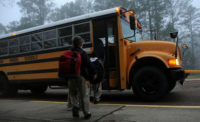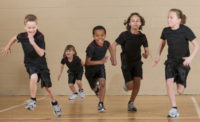With the start of a new school year fast approaching, the National Highway Traffic Safety Administration (NHTSA) reminds all drivers, students and parents to put safety first in school zones and near bus stops. Students travel to school by a variety of means: school bus (the safest means of transportation to and from school), walking, bikes, public transportation, or in vehicles with family or friends. It is everyone’s responsibility to use caution and stay focused and alert around traffic to ensure children can travel to and from school safely.
According to NHTSA data, from 2004 to 2013, there were 327 school-age children who died in school-transportation-related crashes; 54 were occupants of school transportation vehicles, 147 were occupants of other vehicles, 116 were pedestrians, and 9 were pedalcyclists. There were more school-age pedestrians killed between the hours of 7 and 8 a.m. and between 3 and 4 p.m than any other hours of the day.
NHTSA offers the following traffic tips for everyone (motorists, children and their parents):
- Motorists should drive with extra caution around children going to/from school:
- Obey signs, signals, and crossing guards in school zones.
- Slow down especially with children walking/biking to school and around bus stops and in school zones and in low light or bad weather.
- Learn and obey the school bus laws in your State.
- Drive focused and alert at all times. Avoid use of electronic devises and other distracting behaviors while driving.
- Ensure everyone in the vehicle is buckled up properly and that children are in the back seat in the proper seat.
- Drop off so the child does not have to cross the street, and then avoid U-turns.
- Look for and expect to see pedestrians and bicyclists, especially before and after school.
School bus riders are safest when children:
- Stay three giant steps (six feet) away from the curb when waiting for the bus; and when the school bus arrives, wait until the driver says to board.
- Quickly board the school bus, find a seat, sit facing the front, and do what the school bus driver and safety patrols say to do.
- Getting off the bus, cross in front at least five giant steps (10 feet) away and look left-right-left for traffic. Wait for the driver to signal it is safe to cross
- Walking to school is safer when children:
- Walk with an adult, responsible older sibling, or in a group.
- Walk on the sidewalk if there is one, or walk facing traffic as close to the edge as possible.
- Walk focused and alert. Never use electronics when crossing the street.
- Pay attention to their surroundings and don’t play with, push or shove others.
- Cross at a corner, in a crosswalk, or with a pedestrian WALK signal.
- Stop and look left-right-left for all traffic, including bicycles, before crossing. Cross only when it is clear.
- Wear bright colors and/or use lights or reflective gear to be more visible to motorists.
Biking to and from school is safer when children and adults alike:
- Wear and buckle a properly fit helmet every ride.
- Wear bright colors and/or use lights or reflective wear to be more visible to motorists.
- Have a good grasp of traffic safety rules including riding in the same direction as traffic and stopping at all stop signs and signals.
- Choose safe routes to ride, including streets with lower traffic volume and speeds.
- Ride focused and alert—never using electronics or both ear buds while riding.
More school bus safety information can be found by clicking here: School Bus Safety Information






